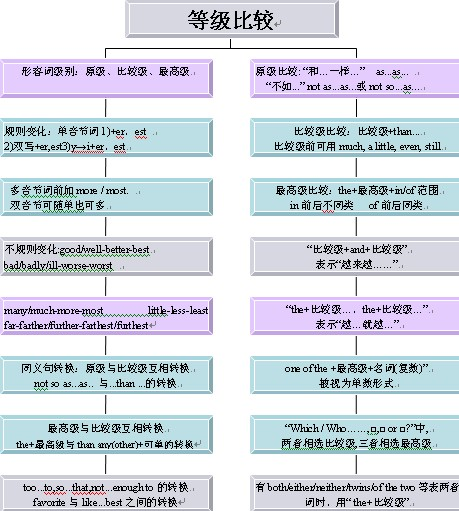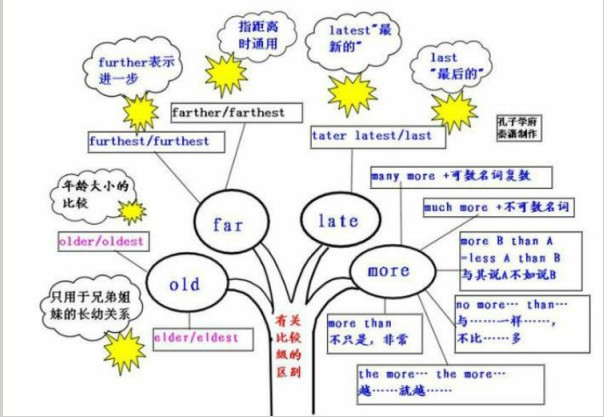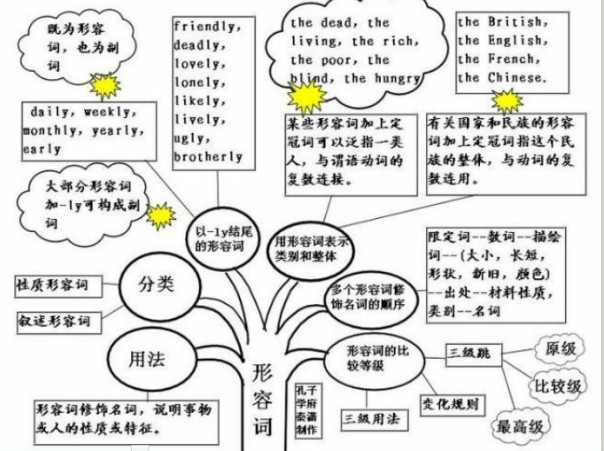本试题 “It's not as _______ as yesterday, so there are _______ children playing with their parents in thePeople's Square.[ ]A. warm; fewerB. warm; lessC. w...” 主要考查您对形容词的比较级
形容词
等考点的理解。关于这些考点您可以点击下面的选项卡查看详细档案。
- 形容词的比较级
- 形容词
形容词比较级概念:
大多数形容词(性质形容词)有比较级,用来表示两个人或事物之间的比较“较……”。
如:I am taller than you.
形容词比较级特殊用法:
1、没有比较对象的比较结构:
所谓没有比较对象的比较结构不是指省略而言,而是指并非真正的比较。
例如:The car runs faster than110 miles. 那辆车时速为110多英里。
There is more than one solution to the problem. 这个问题的解决办法不止一个。
The daily cost in an average hospital in the United States can run as high as $250. 在美国普通医院的每天的费用可高达250美元。
2、用比较级的形式表达最高级的意思:
在这种情况下,往往是将一个人或是一件事与其他所有的人或事相比较。注意别忘了常在比较状语中用any, other, else类的字眼,以将比较主体排除在比较对象以外,因为自己不可以与自己相比较。
例如:He is taller than any one else in our class. 他在我们班比其他任何都高。
Iron is more useful than any other metals. 铁比其他任何金属更有作用。
3、no+比较级+than的结构表示“A和B一样不……”:
例如:She runs no faster than her sister.她与她妹妹一样跑不快。
Tom is no wiser than John. 汤姆和约翰一样没有聪明才智。
He is no richer than his brother. 他与他弟弟一样不富有。
4、汉语可以说“昆明的气候比兰州好”。英语必须加that:
例如:The climate of Kunming is better than that of Lanzhou.
5、英语比较级常译作“较…”、“…一些”等,但不等于汉语的“更…”。汉语的“更…”须用“still”或“even”来表示:
如:This book is even more difficult than that one. 这本书比那本书更难。
6、有些情况下,汉语不用“较”等字眼,英语则须用比较级:
如:Will the younger people give their seats to old people? 请年轻人把座位让给老年人好不好?
形容词比较级的用法:
1、比较级用于二者的比较,其结构是:含有形容词比较级的主句+从属连词than引导的从句(从句中常省去意义上和主句相同的部分)。
如:Li is older than Zhou. 李比周年纪大。(从句中省去了is old)
There are more children in this nursey than in that one. 这个托儿所的孩子比那个托儿所多。(从句中省去了there are children)
After two years' physical training, she is healthier and stronger. 经过两年的体力锻炼,她(比以前)健康强壮多了。(注意这里省去了从句than she was)
We are much better off than ever before. 我们的生活比过去任何时候都要好得多。(than后省去了we were)
Paul weighs less than harry. 保尔的体重比哈利轻。
Mary is less clever than Jane. 玛丽不如简那么聪明。
2、可修饰比较级的词:
1)a bit, a little, rather, much, far, by far, many, a lot, lots, a great deal, any, still, even等
2)还可以用表示倍数的词或度量名词作修饰语。
3)以上词(除by far)外,必须置于比较级形容词或副词的前面。
典型例题:
1)—Are you feeling ____?
—Yes,I'm fine now.
A. any well
B. any better
C. quite good
D. quite better
答案:B. any可修饰比较级,quite修饰原级,well的比较级为better.
2)The experiment was____easier than we had expected.
A. more
B. muchmore
C. much
D. moremuch
答案:C. much可修饰比较级,因此B,C都说得通,但easier本身已是比较级,不需more,因此C为正确答案。
3)If there were no examinations, we should have___at school.
A. the happiest time
B. a more happier time
C. much happiest time
D. a much happier time
答案:D.
注:many, old和far用法:
1)如果后接名词时,much more+不可数名词 many more+可数名词复数
2)old有两种比较级和最高级形式:older/oldest和elder/eldest。elder,eldest只用于兄弟姐妹的长幼关系。
如:My elder brother is an engineer.
3)far有两种比较级,farther,further在英语中两者都可指距离。在美语中,father表示距离,further表示进一步。
如:I have nothing further to say.
3、比较级中的两个特殊作用的结构:
1)The+比较级+句子,表示的意义是“越(怎么样就)越(怎么样)”,在这个结构中的两个“比较级”不要求一定词性相同,它们各自的词性要依句子的需要而定;
2)和比较级+and+比较级。表示的意义是“越来越(怎么样)”,在这个结构中的两个“比较级”则要求词性相同。
例如:The harder you work at your study, the better academicrecords you will have. 你学习越努力,你的成绩就越好。
The more we have, the more we want. 人欲无穷。
When winter is coming, it gets colder and colder. 冬天来临之际,天越来越冷了。
He became less and less satisfied with the foot ball team's performance. 他对足球队的表现越来越不满意了。
形容词比较等级知识体系:

特殊形容词比较级变化:

形容词的概念:
形容词(adjective),简称adj.或a,形容词用来修饰名词或代词,表示人或事物的性质、状态,和特征的程度好坏与否,形容词在句中作定语、表语、宾语补足语。通常,可将形容词分成性质形容词和叙述形容词两类,其位置不一定都放在名词前面。
形容词的作用与位置:
形容词是用来修饰名词的,常被放在名词前作定语,或放在系动词后面作表语。以下属几种特殊情况,须牢记;
(1)形容词短语作定语,定语后置。
如:a language difficult to master,
a leaning tower about 180 feet high
(2)表语形容词(afraid、alike、alone、asleep、awake、alive等)作定语,定语后置。如a man alive。有些表身体健康状况的形容词如well、faint、ill只作表语。sick既可作表语又可作定语,ill如作定语意为“bad”。
(3)用作定语,修饰由不定代词one、no、any、some和every构成的复合词如anything、something等时,通常后置。
如:I have something important to tell you.
(4)else常用作疑问代词和不定代词的后置定语。
(5)enough、nearby修饰名词前置或后置,程度副词一般位于形容词、副词前面,enough修饰形容词、副词时,必须后置。
(6)几个并列的形容词作定语,其语序通常为:限定语(The、A)+描绘性形容词+size(大小)+shape(形状)+age(年龄、时间)+color(颜色)+origin(国籍、来源)+material(材料)+purpose(目的)+名词。
口诀:
限定描绘大长高,形状年龄和新老;颜色国籍跟材料,作用类别往后靠。
如:a heavy black Chinese steel umbrella,
the man's first tow interesting little red French oil paintings
形容词的用法:
1、形容词修饰名词,说明事物或人的性质或特征。通常,可将形容词分成性质形容词和叙述形容词两类,其位置不一定都放在名词前面:
1)直接说明事物的性质或特征的形容词是性质形容词,它有级的变化,可以用程度副词修饰,在句中可作定语、表语和补语。例如:hot热的。
2)叙述形容词只能作表语,所以又称为表语形容词。这类形容词没有级的变化,也不可用程度副词修饰。
大多数以a开头的形容词都属于这一类。例如:
afraid害怕的。(错)Heisanillman. (对)Themanisill. (错)Sheisanafraidgirl. (对)Thegirlisafraid.
这类词还有:well,unwell,ill,faint,afraid,alike,alive,alone,asleep,awake等。
3)形容词作定语修饰名词时,要放在名词的前边。但是如果形容词修饰以-thing为字尾的词语时,要放在这些词之后。例如:somethingnice
2、用形容词表示类别和整体:
1)某些形容词加上定冠词可以泛指一类人,与谓语动词的复数连接。如:the dead,the living,the rich,the poor,the blind,the hungry The poorarelosinghope.穷人失去了希望。
2)有关国家和民族的形容词加上定冠词指这个民族的整体,与动词的复数连用。如:the British,the English,the French,the Chinese. The English have wonderful senseofhumor.
以-ly结尾的形容词:
1)大部分形容词加-ly可构成副词。但friendly,deadly,lovely,lonely,likely,lively,ugly,brotherly,仍为形容词。改错:
如:(错)She sang lovely.
(错)He spoke to me very friendly.
(对)Her singing was lovely.
(对)He spoke to me in a very friendly way.
2)有些以-ly结尾既为形容词,也为副词。 daily,weekly,monthly,yearly,early .
如:The Times is a daily paper.
The Times is published daily.
形容词知识体系:

复合形容词的构成:
(1)形容词+名词+ed:
如:kind-hearted 好心的,white-haired 白发的
(2)形容词+形容词:
如:red-hot 炽热的,dark-blue 深蓝的
(3)形容词+现在分词:
如:good-looking 好看的,easy-going 随和的
(4)副词+现在分词:
如:hard-working 勤劳的,fast-moving 快速转动的
(5)副词+过去分词:
如:hard-won 得来不易的,newly-made 新建的
(6)名词+形容词:
如:life-long 终生的,world-famous 世界闻名的
(7)名词+现在分词:
如:peace-loving 爱好和平的,fun-loving 爱开玩笑的
(8)名词+过去分词:
如:snow-covered 白雪覆盖的,hand-made 手工的
(9)数词+名词+ed:
如:four-storeyed 4层楼的,three-legged 3条腿的
(10)数词+名词(名词用单数):
如:ten-year 10年的, two-man 两人的
与“It's not as _______ as yesterday, so there are _______ ch...”考查相似的试题有:
- Don’t ask me to prepare the picnic lunch, I’m not ______ a cook.A.much ofB.better thanC.good atD.much as
- Boris has brains.In fact, I doubt whether anyone in the class has _______ IQ.A.a highB.a higherC.the higherD.the ...
- I’m ____ at sums that Joan, but better at history.A.moreB.lessC.worseD.cleverer
- ----Thank god, you finally returned home _____.----You can never imagine how I worried about you when I was told abou...
- Judging from his _______ look, I know it is a very _____ situation to her.A.confused; confusedB.confusing; confusin...
- After a 68-hour flight in the Shenzhou VII spaceship, three astronauts Zhai zhigang, Liu Boming and Jing Haipeng retu...
- I usually go shopping in that supermarket, because their prices are _____.A.expensiveB.cheapC.highD.low
- At the age of fourteen , Betty went to a _____ girls’ school along with her sister .A.NearB.nearbyC.closeD.neighbor
- After days of fantastic space trip, the three astronauts walked out of the spaceship, _______.A.tired but happyB.ti...
- From his _______expression, we can guess that the problem maybe was quite _______.A.puzzled ; puzzlingB.puzzling; p...